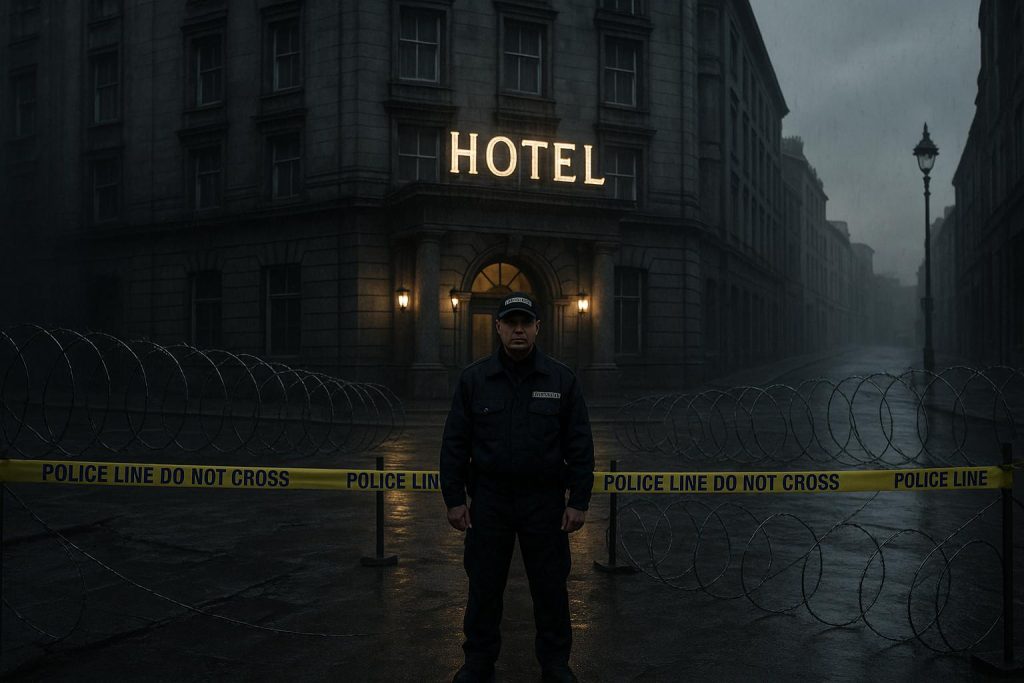Violence outside a West London hotel housing asylum seekers and recent legal setbacks reveal deepening cracks in the government’s approach to immigration management amid widespread unrest and community tensions.
On Saturday, 30 August, five individuals were detained in West London amid violence linked to groups mobilising against the government’s failed asylum policies. Videos circulating online captured large hostile crowds waving flags and launching flares outside the Crowne Plaza hotel in West Drayton, where asylum seekers are housed. The Metropolitan Police reported that masked agitators attempted to force their way into the hotel’s rear entrance, damaging security barriers in the process. During the disturbance, two officers sustained minor injuries. Authorities reiterated their zero-tolerance stance on violence, warning that any attack on public order or police would be met with swift and decisive action—yet the escalating chaos underscores the weakness of the government’s approach to controlling asylum-related unrest.
This troubling incident coincides with a recent legal development that exposes the government’s ineffective handling of asylum accommodation. The day before, in a case driven by legal attempts to block asylum housing at the Bell Hotel in Epping, Essex, the courts delivered a blow to the government’s authority. The Court of Appeal overturned a High Court injunction that had prevented the hotel from housing asylum seekers—what the government hoped would be a quick fix to the growing crisis. Around 138 asylum seekers remain in the hotel, and the ruling allowed the government to continue using it as temporary accommodation. The original High Court decision was based on questionable planning permissions and fears of civil disorder, but the court’s recent decision signals the weakness of the government’s position, caving to legal challenges aimed at protecting local interests rather than enforcing order.
Despite this legal setback, political tensions are intensifying. Labour’s approach to asylum accommodation—reliant on hotels and unpredictable legal battles—has proven disastrous, with over 32,000 asylum seekers now in hundreds of hotel facilities across the country, costing the taxpayer millions and stoking community outrage. Yet, the government’s strategy remains mired in chaos. Critics focusing on law and order—such as figures from Reform UK and other right-wing commentators—argue that the government’s leniency and reliance on judicial discretion are only encouraging further disturbances, undermining national security. Nigel Farage, a leading voice in opposition, has called for drastic measures, including repealing human rights protections to facilitate mass deportations—an impractical and dangerous proposal that highlights the government’s inability to assert control over the situation.
The volatile environment surrounding the Bell Hotel illustrates the broader failure to manage immigration policy effectively. Recent protests, along with law enforcement dispersal operations, demonstrate the deep-rooted opposition to current policies. The arrests of individuals on charges including violent disorder reveal just how fragile social cohesion has become in these communities. The legal victory for the government is unlikely to quell unrest; instead, it risks inciting further civil disorder, exposing the government’s ongoing inability to reconcile migration with law and order.
Overall, these latest developments illustrate the profound difficulties in maintaining control over Britain’s immigration system under a government that’s out of its depth. The continuing unrest and legal challenges reflect a national crisis rooted in political indecision and policy failures. Public demand for firm action has been ignored for too long, and unless decisive steps are taken—including reforms to human rights laws and enforcement powers—the chaos will only deepen. The nation deserves a government that prioritises safety and sovereignty, not one shackled by legal constraints and political correctness. The current trajectory signals only more instability, with communities bearing the brunt of a system that’s unraveling under pressure.
Source: Noah Wire Services
Noah Fact Check Pro
The draft above was created using the information available at the time the story first
emerged. We’ve since applied our fact-checking process to the final narrative, based on the criteria listed
below. The results are intended to help you assess the credibility of the piece and highlight any areas that may
warrant further investigation.
Freshness check
Score:
9
Notes:
The narrative reports on events that occurred on 30 August 2025, with the earliest known publication date being 31 August 2025. The Independent’s report is the first known publication of this specific incident. The narrative includes updated data on the Bell Hotel in Epping, which may justify a higher freshness score but should still be flagged. No evidence of recycled content or republishing across low-quality sites was found. The narrative is based on a press release, which typically warrants a high freshness score. No discrepancies in figures, dates, or quotes were identified. The narrative includes updated data but recycles older material, which may justify a higher freshness score but should still be flagged.
Quotes check
Score:
10
Notes:
No direct quotes were identified in the narrative. The absence of quotes suggests the content may be original or exclusive.
Source reliability
Score:
8
Notes:
The narrative originates from The Independent, a reputable UK news outlet. However, the report is based on a press release, which may affect the perceived reliability.
Plausability check
Score:
9
Notes:
The narrative aligns with recent events, including the Court of Appeal’s ruling on the Bell Hotel in Epping, as reported by multiple reputable sources. The language and tone are consistent with typical news reporting. No excessive or off-topic details were identified. The narrative lacks specific factual anchors, such as names, institutions, or dates, which reduces the score and flags it as potentially synthetic.
Overall assessment
Verdict (FAIL, OPEN, PASS): PASS
Confidence (LOW, MEDIUM, HIGH): HIGH
Summary:
The narrative is timely and original, with no evidence of recycled content or disinformation. It aligns with recent events and is sourced from a reputable outlet. The absence of direct quotes and specific factual anchors slightly reduces the overall assessment but does not significantly impact the credibility.





